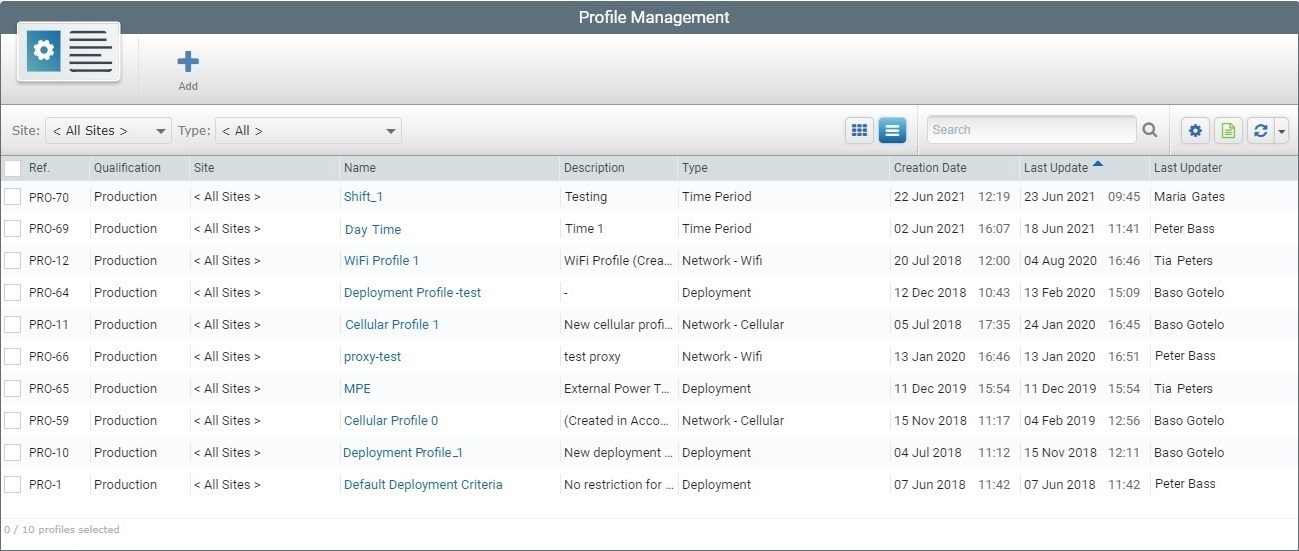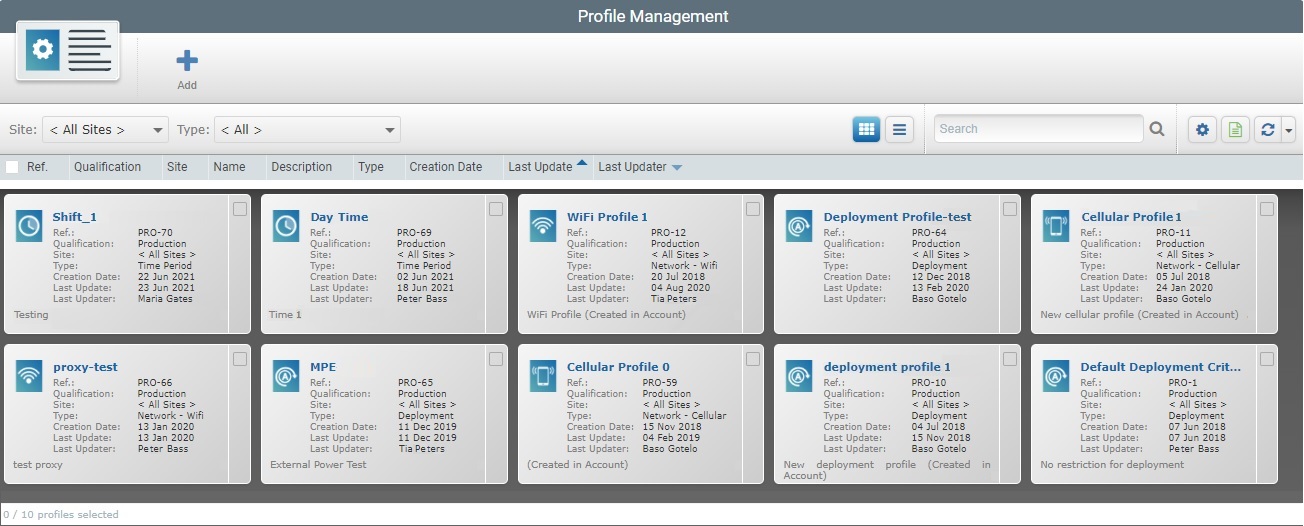Profiles
Overview
MCL-Mobility Platform allows you to create several profile types to be applied throughout the account:
•Deployment profile - This type of profile specifies the necessary conditions to trigger a deployment (ex: when it should start and the necessary power and network conditions).
•Network profile - This profile type is a set of communication parameters that regulates specific interactions between the devices and the MCL-Mobility Platform, namely, the pairing of the devices into the account. There are 2 sub-types of Network profiles:
▪Wifi Network profiles - These network profiles define wifi communication settings such as SSID ("Service Set Identifier"), authentication and proxy.
▪Cellular Network profiles - These network profiles define cellular communication settings such as APN ("Access Point Name") and APN type, MCC ("Mobile Country Code"), MNC ("Mobile Network Code") and proxy.
•Time Period profile - This type of profile is used to specify time periods (ex: a day, a warehouse shift) which will be used to aggregate data. This information can, then, be displayed in a Dashboard according to those time periods.
For instance, you may want to analyze the data coming from a night shift that starts at 20:00 one day and finishes at 08:00, the next day. The default time periods are not adequate for this situation so being able to create specific time periods can be very useful. The time frames you define within this profile will become available in the dashboards and compatible widgets (in the Period Resolution related drop-downs) as long as the intended Time Period profile is associated to a site. See Account Details - Time Period Tab.
There is a "Profiles" sub-module available at account and site level:
•The "Profiles" sub-module that is included in the account's "Set Up" module allows the account administrator to create, edit, delete or duplicate all the Deployment, Network and Time Period profiles included in the account. Meaning, he views the profiles he created and the ones created within each site (even if they are restricted to a specific site) regardless of the qualification.
•The "Profiles" sub-module contained in a site's "Set Up" module is used by the site manager and any site user with the necessary access rights to manage the profiles that concern their own site and the ones that were created at account level with the same qualification as the site's.
The "Profile Management" Page
To access the "Profile Management" page, click ![]() (located in the "Control Panel) and, in the resulting row, select
(located in the "Control Panel) and, in the resulting row, select ![]() to view all the Deployment/Network/Time Period profiles in the account.
to view all the Deployment/Network/Time Period profiles in the account.
This page includes profile related information, allows for several profile related operations and provides access to the details page of each available profile.
•The information can be displayed in a Grid or a List view. Use ![]() or
or ![]() to define the most appropriate view:
to define the most appropriate view:
▪![]() (default view) organizes the page into a List view:
(default view) organizes the page into a List view:

This view displays the following information:
Ref. |
Internal reference that identifies the profile. It is automatically generated when the profile is created and it cannot be changed. |
Qualification |
The profiles's qualification. There are 4 qualifications available (see Qualification): •"Production" - for profiles that are used in the customer's working environment, to assist in day-to-day tasks. •"Acceptance" - for profiles that are used for specific testing in an environment that mimics the customer's working environment. •"Test" - for profiles that are used in more general tests. •"Development" - for profiles that are used in a development environment. |
Site |
The entity the profile is associated to. If a profile is restricted to a site, the site's name is displayed. If not, the field displays "<All Sites>", meaning, the profile is associated to the account and available to all the sites included in the account. |
Name |
The profiles's name (which is displayed in light blue). Click the name to access the corresponding profile's details page. See Profile Details. |
Description |
Information about the profile that was added in the "Description" field of the profile's details page. |
Type |
The profiles's type - "Deployment", "Network - Cellular", "Network - Wifi" or "Time Period". |
Creation Date |
The date and time the profile was created. |
Last Update |
The date and time of the profiles's last update. |
Last Updater |
The name of the user that updated the profile last. |
OR
▪Use ![]() to organize the page into a Grid view:
to organize the page into a Grid view:

This view displays the following information:
(Name) |
The profiles's name which is displayed in light blue. Click the name to access the corresponding profile's details page. See Profile Details. |
Ref. |
Internal reference that identifies the profile. It is automatically generated when you create the profile and cannot be changed. |
Qualification |
The profiles's qualification ("Production", "Acceptance", "Test" or "Development"). See Qualification. |
Site |
The entity the profile is associated to. If a profiles's version is restricted to a site, the site's name is displayed. If not, the field displays "<All Sites>", meaning, the profile is associated to the account and available to all the sites included in the account. |
Type |
The profiles's type - "Deployment", "Network - Cellular", "Network - Wifi" or "Time Period". |
Creation Date |
The date and time the profile was created. |
Last Update |
The date and time of the profiles's last update. |
Last Updater |
The name of the user that updated the profile last. |
Description |
Information about the profile that was added in the "Description" field of the profile's own details page. |
![]() If some of these fields/columns are NOT available, use the
If some of these fields/columns are NOT available, use the ![]() button (upper right corner) to open a list with the available fields/columns and check the ones you want to display.
button (upper right corner) to open a list with the available fields/columns and check the ones you want to display.
•If necessary, you can restrict the available profile list with the use of the "Site" and/or "Type" filters:

![]() Use this drop-down to filter the displayed information by site/account:
Use this drop-down to filter the displayed information by site/account:
▪ Select "<All Sites>" to view the profiles that are available to all the account's sites (= profiles that are NOT restricted to a site).
▪Select the intended site to check the profiles that are restricted to it.
▪Select "<All>" for a full view of the existing profiles in the account.
![]() Use this drop-down to limit the profile display by type:
Use this drop-down to limit the profile display by type:
▪Select the intended profile type - "Deployment", "Network - Cellular", "Network - Wifi" or "Time Period".
▪For a full view, select/maintain the "<All>" option.
Example 1 - Site: <All> + Type: Deployment The list includes all the Deployment profiles created within the account - the ones available to all the sites and the ones that are restricted to a specific site.
Example 2. Site: <All Sites> + Type: Deployment ONLY the Deployment profiles that are available to all the sites are listed.
Example 3. Site: <London> + Type: Network - Wifi The list ONLY includes Network Wifi profiles that are associated to the "London" site (restricted to or created within this site).
Example 4. Site: Lisbon + Type: Time Period There are NO Time Period profiles associated to the "Lisbon" site.
|
•There is a search tool to look for specific profiles:
![]()
a. Enter the name of the profile you are searching for or a word from its description.
b. Click ![]() or press <ENTER> in your PC keyboard to initiate the search.
or press <ENTER> in your PC keyboard to initiate the search.
c. Use one of the following to clean the searched data to start a new search or return to a full view:
▪empty the search box and click ![]() ;
;
▪empty the search box and press <ENTER> in your PC keyboard;
▪click the ![]() icon.
icon.
•Use ![]() to define which columns/fields should be hidden or shown:
to define which columns/fields should be hidden or shown:
a. Click ![]() , which is located on the upper right corner, to open the list of available columns/fields.
, which is located on the upper right corner, to open the list of available columns/fields.
b. Check/uncheck the intended columns/fields.
c. Click ![]() again to hide the list and apply.
again to hide the list and apply.
•If necessary, click ![]() to export a "*.csv" file with a list of the displayed profiles. The export only concerns the currently viewed/filtered profiles and corresponding displayed columns/fields.
to export a "*.csv" file with a list of the displayed profiles. The export only concerns the currently viewed/filtered profiles and corresponding displayed columns/fields.
![]() You can use the "Site" and/ or "Type" filters to define what you want/need to export.
You can use the "Site" and/ or "Type" filters to define what you want/need to export.
If you only need certain columns, use ![]() to show/hide the intended columns (click this button to expand the list of columns and check/uncheck the columns, as needed).
to show/hide the intended columns (click this button to expand the list of columns and check/uncheck the columns, as needed).
•Use ![]() to refresh the page and define a Page Refresh cycle:
to refresh the page and define a Page Refresh cycle:
▪Click ![]() for an automatic Page Refresh.
for an automatic Page Refresh.
▪Use ![]() to define the page's Refresh cycle:
to define the page's Refresh cycle:
a. Click ![]() to access the drop-down with the available time periods ("Disabled"; "Auto" (default option); "1 minute"; "# minutes").
to access the drop-down with the available time periods ("Disabled"; "Auto" (default option); "1 minute"; "# minutes").
b. Select the preferred Page Refresh cycle.
c. Click the arrow again to hide the list.
If you select "Disabled", the page's content is ONLY refreshed when you click ![]() .
.
A blue vertical gauge in the middle of the button displays the Refresh cycle's progress.
•If necessary, you can reorder the information in the columns.
Mouse over the desired column header to access the sorting arrow and organize/select the corresponding column's listed items:
▪![]() by ascending order.
by ascending order.
▪![]() by descending order.
by descending order.
•If you want to select all the listed items (in this case, all the profiles) at once, click the column header's checkbox.

To create a profile, use the ![]() button. This option is ONLY available in the page's header if NO profile is selected. For more detailed information, see Creating a Profile.
button. This option is ONLY available in the page's header if NO profile is selected. For more detailed information, see Creating a Profile.
To duplicate a profile, use the ![]() button. This option is only visible in the page's header if you select one(1) profile from the list. For more detailed information, see Duplicating a Profile.
button. This option is only visible in the page's header if you select one(1) profile from the list. For more detailed information, see Duplicating a Profile.
To delete a profile, use the ![]() button. This option is visible in the page's header if you select one(1) or more profiles from the list. For more detailed information, see Deleting a Profile.
button. This option is visible in the page's header if you select one(1) or more profiles from the list. For more detailed information, see Deleting a Profile.
This chapter includes all the aspects associated to profiles.
Topic/Operations |
Description |
|---|---|
View the details of a profile. |
|
Create a profile. |
|
Edit a profile. |
|
Duplicate a profile. |
|
Delete a profile. |